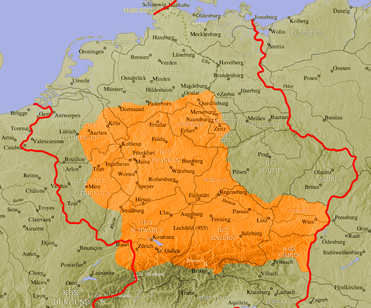Old High German
Conjugate VerbsFacts
- Language: Old High German
- Alternate names:
- Language code: goh
- Language family: Indo-European, Classical Indo-European, Germanic, Northwest Germanic, West Germanic, High German, Upper German
- Number of speakers: Extinct
- Script:
More information:
Introduction
German Language Periods
- Old High German is the earliest stage of the German language, conventionally covering the period from around 500 to 1050 CE.
- Middle High German is the term used for the period in the history of the German language between 1050 and 1350.
- Modern German is the language spoken today.
Old High German was is the earliest stage of the German language. It was spoken in Southern and Central Germany, Switzerland and Austria.

Old High German speaking areas around 950.
The main difference between Old High German and the West Germanic dialects from which it developed is that it underwent the Second Sound Shift or High German consonant shift. This is generally dated very approximately to the late 5th and early 6th centuries—hence dating its start to around 500. The result of this sound change is that the consonantal system of German remains different from all other West Germanic languages, including English and Low German.
Grammatically, however, Old High German remained very similar to Old English, Old Dutch, and Old Saxon.
The verb
The Old High German verb had
- 3 Moods: Indicative, Optative, and Imperative;
- 2 Numbers: Singular and Plural;
- 3 persons
Sample verb nëman 'to take'
| Person | Indicative | Optative | Imperative | ||
| Present | Past | Present | Past | ||
| Sg.1 | nimu | nam | nëme | nāmi | - |
| Sg.2 | nimis (-ist) | nāmi | nëmēs (-ēst) | nāmīs (-īst) | nim |
| Sg.3 | nimit | nam | nëme | nāmi | - |
| Pl.1 | nëmemēs (-ēn) | nāmumēs (-un) | nëmemēs (-ēn) | nāmīmēs (-īn) | nëmamēs, -emēs (-ēn) |
| Pl.2 | nëmet | nāmut | nëmēt | nāmīt | nëmet |
| Pl.3 | nëmant | nāmun | nëmēn | nāmīn | - |
Verblist
anaqueman, antwurten, arlosen, bachan, badon, bagan, beran, bergan, beton, biben, bidrangon, bidringan, biginnan, bihroffen, bintan, biogan, biotan, biroufen, biskizan, bitten, biwintan, bizan, bluoten, borgen, boron, brehhan, brennen, brestan, breton, bringan, briuwan, bruhhan, buan, dankon, denken, dihton, dolen, draen, drangon, drengen, dreskan, dringan, drucchen, eindrucchen, ezzan, faldan, fallan, faltan, faran, fasten, fehtan, felhan, findan, firsahhan, firzeran, flehan, fliogan, fliohan, fluohhon, fogalon, folgen, friosan, fullen, fuolen, fuotaren, gan, gangan, garwen, geban, geltan, gen, gibintan, gifregnan, gileiten, gimanagfalton, ginen, ginenden, giozan, gisahhan, giwaltan, giwinnan, giwintan, glitan, gluoen, gnagan, grifan, haben, haltan, hangen, hazzon, heffen, heizen, heizzan, helfan, hevan, horen, houwan, hraffon, hruzzan, hullan, intbintan, irren, irron, jagon, jesan, jetan, jucchen, kiosan, klazz(j)an, koufon, krahhon, krimman, krimmjan, kruzigon, kweman, lazan, leben, leiben, leren, lernen, lesan, lezzen, lihhen, lobon, losen, lubon, mahhon, managfalton, meinen, meinian, minnon, miskan, miskian, mugan, munan, neman, nerien, niozan, niusen, pagan, queman, raspon, reichen, ridan, riohhan, risan, ritan, roufen, ruofan, sagen, sahhan, scephan, sciozzan, scolan, scouwon, sculan, seggen, sehan, sellen, singan, sinkan, sinnan, siodan, sitten, sizzen, skerzan, skiozan, skirmen, skirnjan, skritan, slafan, slahan, slihhan, spahhan, sprehhan, stadjan, stan, stantan, stehhan, sten, sterban, stoffon, stritan, sufton, suohhen, sweren, thankon, thenken, thionon, toufen, touwen, tragan, trinkan, triogan, triugan, tugan, tuomen, tuon, uualtan, uzneman, wahhen, wahsan, wahten, wanen, waron, weinon, wellen, werdan, werfan, wesan, widarsahhan, wintan, wisen, wizzan, wuntaron, wuofen, zellen, zeman, zittaron, zwehon, zwifalon, ƿerdan, ƿerpan.
References
- Braune, Wilhelm. Althochdeutsche Grammatik. Max Niemeyer Verlag. Tübingen, 1987.